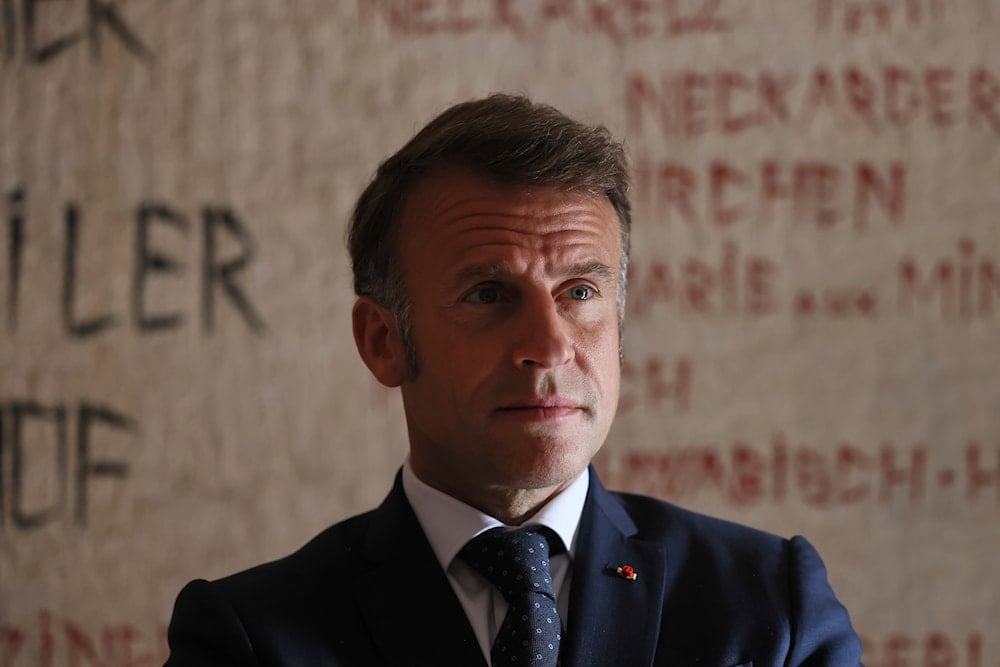Macron's bid for relevance amid domestic decline: National Interest
With limited options at home, French President Emmanuel Macron turns to the Middle East to assert global influence before the end of his term.
-

French President Emmanuel Macron visits a photo exhibition at the Paris Holocaust Memorial, ahead of Victory Day celebrations, Monday, April 28, 2025, in Paris. (AP Photo/Thomas Padilla, Pool)
French President Emmanuel Macron finds himself constrained at home and increasingly turning to foreign policy, particularly in the Middle East, in his last two years remaining in his term, Olivier Guitta, the Director of Research at the Henry Jackson Society, wrote in The National Interest on Sunday.
Guetta argues that Macron's options in France remain limited, even with the far-right Marine Le Pen potentially sidelined by a recent court ruling. The President's relevance is shrinking within national borders and is refocusing on foreign affairs.
For Macron, Lebanon could be the last foothold in France's former colonial sphere of influence. It is important to mention that France’s special relationship with Lebanon dates back to 1649 and continues to shape its diplomatic posture in the region.
Guetta says that like his predecessors, Macron has adhered to the "Arabist line" traditionally promoted by the Quai d’Orsay, France’s Foreign Ministry. This includes a controversial stance on Hezbollah.
In 2002, then-President Jacques Chirac welcomed martyred Hezbollah leader Sayyed Hassan Nasrallah to the Francophone Summit in Beirut. In 2004, French ambassador to the US Jean-David Levitte described Hezbollah as a mostly "social" organization. France did not support blacklisting Hezbollah's "military wing" as a terrorist entity until 2013, and only then under limited British pressure.
That said, Macron continues to treat Hezbollah as a legitimate political actor, while his administration lobbied the Biden administration to allow France a role in enforcing the Lebanon ceasefire announced in November 2024, Guetta wote, adding that he positioned France as an "honest broker" amid rising tensions between Lebanon and "Israel."
Bait-and-Switch diplomacy with "Israel"
In a calculated diplomatic maneuver, Macron initially hinted that French authorities might arrest Israeli Prime Minister Benjamin Netanyahu and former security minister Yoav Gallant over ICC-related charges. He then retracted the threat, using it as leverage to push for French involvement in ceasefire negotiations.
Guetta further mentions that Macron’s position on "Israel" remains consistent with the post-1967 policy framework adopted by de Gaulle and continued by successive French leaders. France has sought to appear as the only Western state capable of counterbalancing US support for "Israel," a role Macron seems keen to preserve.
According to the author, France’s evolving domestic demographics, including the presence of many Muslims in its populace, play a crucial role in shaping its foreign policy posture. That said, while being mindful of the 2005 suburban uprisings, Macron appears hesitant to express outright support for "Israel," fearing domestic unrest.
His recent announcement that France could recognize a Palestinian state by June was met with swift endorsement from Hamas, reflecting how foreign policy decisions resonate at home.
However, Macron’s hint at unilaterally recognizing Palestine may aim to boost France’s image abroad and ease domestic tensions. With waning influence in Africa and limited political capital at home, his Middle East strategy appears more about salvaging relevance than securing lasting diplomatic gains, wrote The National Interest.
It is worth noting that late last month, "Israel" barred entry to 27 left-wing French parliamentarians who had planned to visit the occupied West Bank, citing their stance on the Israeli occupation and France’s shifting position on the Palestinian cause.
The Israeli Interior Ministry confirmed that the lawmakers’ visas had been revoked just days before their scheduled arrival.

 4 Min Read
4 Min Read








